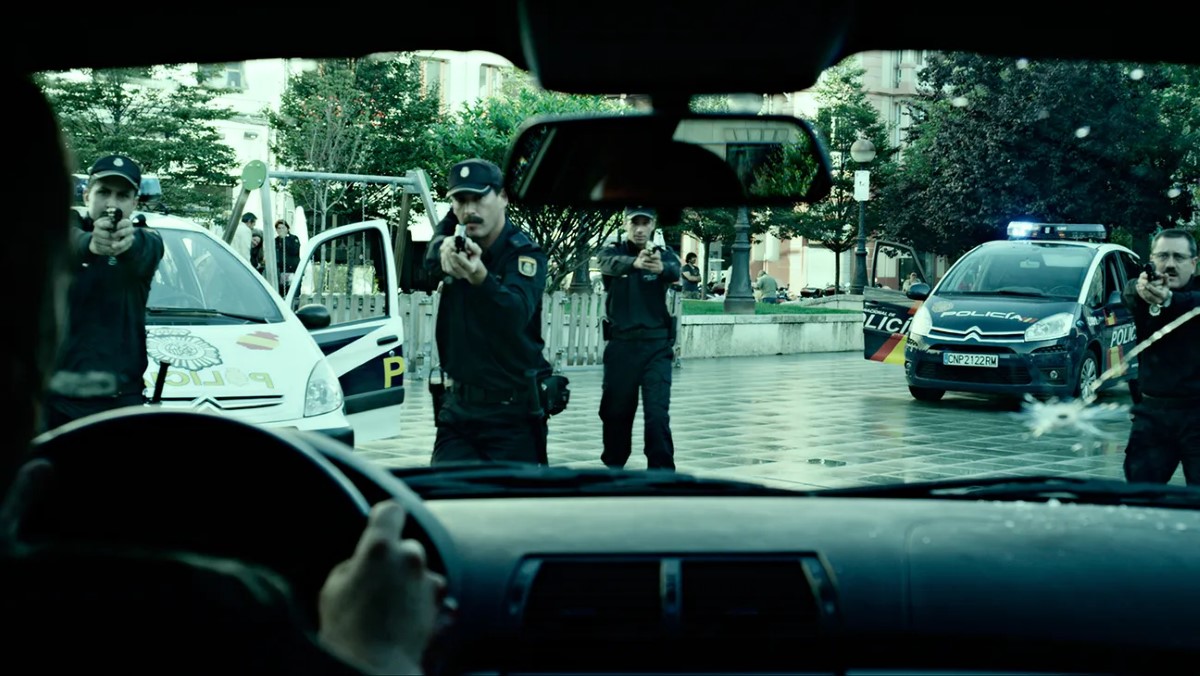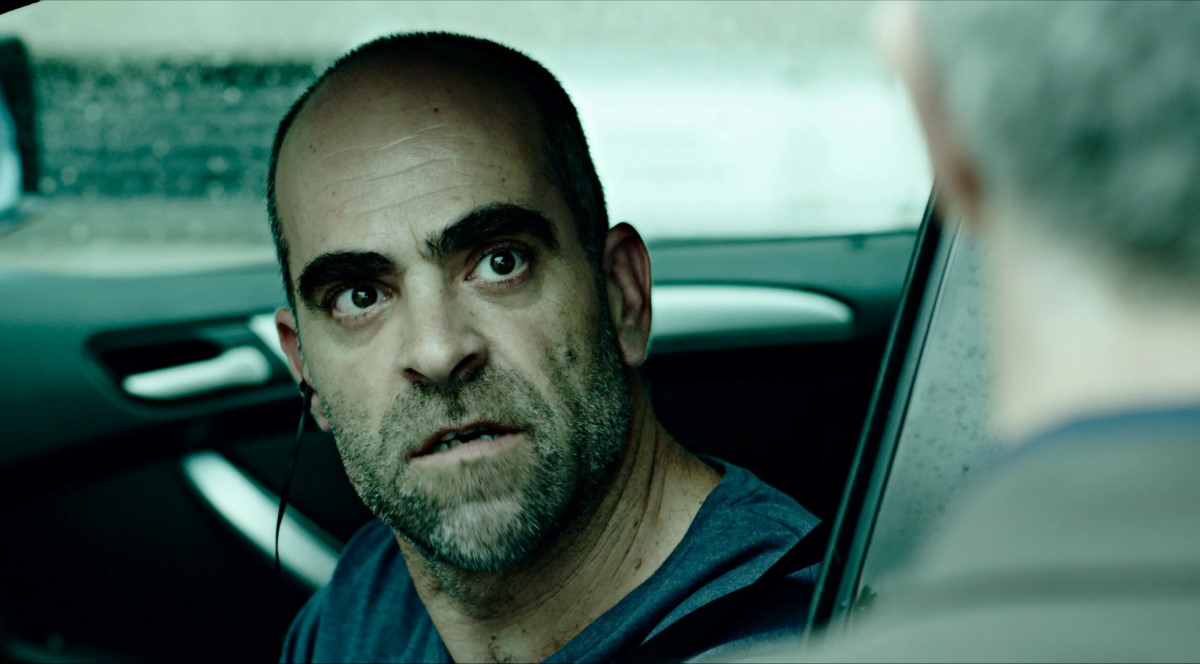Venice Film Review: ‘Retribution’
Pumped up but wholly derivative, Dani de la Torre’s bomb-on-wheels thriller makes for an efficient Hollywood calling card.
by Guy Lodge
“Retribution” is the kind of aggressive-sounding abstract noun that has served as the title for many a boilerplate thriller over the years, so it’s by no means a misleading moniker for Spanish helmer Dani de la Torre’s souped-up but soulless car-chase fiesta. Even more tellingly, its original title translates as “Unknown” — presumably unusable given that it recently graced a Liam Neeson actioner of the knuckle-headedly enjoyable standard to which de la Torre’s debut feature plainly aspires. By any name, however, this story of a corrupt banker trapped behind the wheel when an unidentified bomber targets his sleek BMW SUV is strictly a cruise-control affair: Impersonal, illogical and short on self-aware wit, it’s a curious choice of opener for the independent-oriented Venice Days program. Commercial potential in Spanish-speaking territories is strong; for the director, it’s a persuasive calling card for equivalently anonymous Hollywood assignments.
For anyone who watched “Locke,” Tom Hardy’s compellingly elemental man-at-the-wheel master class, and thought it needed a few more high-concept explosives, “Retribution” is brashly happy to oblige. Alberto Marini’s script even grants its tough protagonist a measure of family-man anguish, though such complications are mere sideshows to its scaled-down rejig of “Speed’s” still-nifty bomb-on-wheels premise. Most adventurous, perhaps, is just what an unsympathetic protagonist Marini and de la Torre have elected to carry this escapade: A well-tailored bank executive with a crumbling trophy marriage and the financial ruin of multiple clients on his conscience, Carlos (Luis Tosar, whose reliably stern conviction fills in for thin writing) isn’t much of a hero.
The pic’s limited commentary on the economic crisis in contemporary Europe is more or less contained in an ostentatious opening aerial shot that takes in Carlos’ coldly luxurious modern mansion in A Coruna. The family’s wealth is presented as something of a self-explanatory reproach. Indoors, relations between Carlos and his wife Marta (Goya Toledo) are palpably strained; his teenage daughter Sara (Paula Del Rio) and 9-year-old son Marcos (Marco Sanz) engage in an ongoing sniping match. Such domestic scene setting is brief: Within minutes, Carlos and his children have strapped themselves into his expensively bulky car for the morning school run.
There they shall remain for a significant stretch of the running time, with Manuel Riveiro’s heavily applied score rumbling ominously even before Carlos answers his phone to an unknown number. The unruffled voice at the end of the line lays out the situation matter-of-factly: A bomb has been placed under each of the car’s seats, set to detonate if any passenger leaves their seated position. Only once Carlos transfers nearly €500,000 into the caller’s account will the devices be deactivated. Thus freezing his characters to the spot — rendering them, if you will, sitting ducks — de la Torre compensates for their stasis with reckless road action. Initially unsure whether or not his anonymous tormentor is bluffing, Carlos drives frenziedly around the scenic city center, d.p. Josu Inchaustegui practically taunting the paralyzed trio with his rapid, unruly camera rotation. Unlike in “Speed” (or even “Crank”), Carlos’ fate doesn’t rest on his pace, but he keeps it up anyway: “Move the car, you’ve been there too long,” the caller admonishes him at one point, as if nervously aware of the script’s potential for static exchanges.

Such jumped-up directorial technique can’t sustain this slim premise far past the midway point, particularly with so little intrigue at hand: The identity of the bomber may be unknown, but his relationship to the venal financier is easily guessed. (The film is called “Retribution,” after all.) So it’s a relief when the authorities eventually crash the party, mistaking Carlos himself for the deranged aggressor. Elvira Minguez is a welcome, no-nonsense presence as a bomb disposal expert convinced of his innocence, even if the script resorts to wafty notions of womanly intuition to back up her claims. “I saw his face,” she says with not-quite-incontrovertible assurance.
In her defense, we see rather a lot of Tosar’s face too, and it’s a good one: firm, characterful and unafraid to crumple completely when moments of abject emotional desperation call for it. (One could plausibly remake this with Neeson, or even Jason Statham, to less moist-eyed and sticky-nosed effect.) The actor keeps proceedings watchable even as the pic’s already tenuous grasp on rationality flies out the rolled-down window; human grit is at a premium by the time cars begins careering backward down city stairs.
Below-the-line contributions are all whizzily proficient, from whirring, crashing sound design to some punishing-looking stunt work, but don’t quite coalesce into a distinct style — if de la Torre’s aim were to present himself as a slick substitute for his compatriot Jaume Collet-Serra, his team has served him well. Inchaustegui’s lensing has a processed, chrome-plated finish that, together with an acrobatic array of swoops and spins, heavily muscularizes what could have been a formally spare exercise. Jorge Coira’s editing is similarly hyperactive, forging a kind of one-way momentum from sheer cumulative effort, even as the script starts spinning its wheels.
Variety, September 2, 2015
Source: https://variety.com/2015/film/festivals/retribution-review-1201584244/





